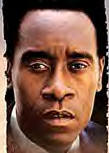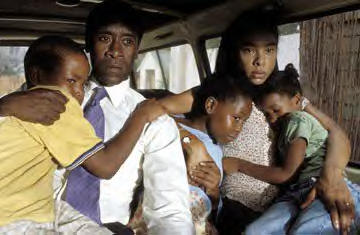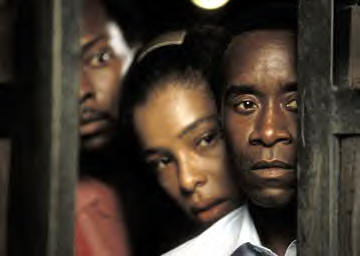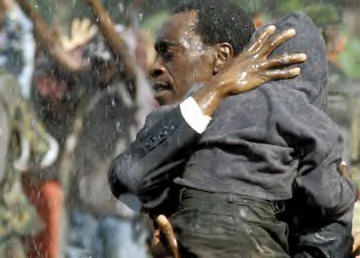

PopEntertainment.com
>
Oscar Nominees >
Feature Interviews - Actors > Feature Interviews A to E >
Don
Cheadle (2004 Interview)

DON CHEADLE
SURVIVING HOTEL RWANDA
By Brad Balfour
Copyright ©2004
PopEntertainment.com. All rights reserved.
Posted: December 21, 2004.
Though it's common knowledge that
forty-year-old Don
Cheadle is a fine actor (Ocean's 12, Boogie Nights),
his starring role in Hotel Rwanda is a tour de force
-- an Oscar-worthy performance. As Paul Rusesabagina, he plays the
man who saves the lives of nearly 1500 people about to be
slaughtered during the 1994 genocide in Rwanda. Cheadle masterfully
handles the telling of this catastrophic experience with humanity and
grace that makes the film (directed by Terry George) one of this year's
best.
What attracted you to this project?
Everything about it was attractive, from the role to being able to tell a
story that relatively few people are aware of. It's shocking but
true. Just to have this kind of experience was great, as well as
meeting Paul and his family. Terry [George] was also a great director. It's
just been a positive experience.
How close did you work with Paul to get his mannerisms?
When I knew I had the movie, we started emailing each other back and forward
and started talking on the phone. I watched a lot of
interviews because Terry actually took Paul
back to Rwanda. It's the first time Paul had been back to Rwanda and filmed
all of his stuff, so I was kind of voyeuristically
taking notes and watching him. Once we got
together it was a lot of hanging out and going to dinner, getting drunk and
telling stories. We spent a good deal of time together at the beginning
of the movie. I was sitting at his feet and getting more of a feel
for his character. I wanted to do some particular
characteristics but I was more trying to just get a feeling for who he was
as a man, his spirit.
Do you have a special responsibility when playing somebody you've met?
Who might get on camera in front of national
audience and say I blew it. [laughing]
Yeah, I guess there's an extra weight involved.
 Thank
God it was Paul and Thank God that we had his involvement from the
beginning. He wasn't someone that we tried to keep in the shadows and not
involve in the process, and ?Just let us tell the movie and we'll check in
with you every once in a while.? He was there on the set and really involved
in how the story unfolded. This was something that had been in development
for years so that was a lot of time that he had to deal with the story. So
yeah, it's a little daunting when he's sitting behind the monitor while
you're doing a scene [laughing] and you're looking at his face trying to
interpret, "is that a frown, is that a grimace, is
that a smile?" And finally,
[you want to say] "Just get him out of
there and take him to the lunch trailer or something. Get him a
sandwich and let me do this scene."
Thank
God it was Paul and Thank God that we had his involvement from the
beginning. He wasn't someone that we tried to keep in the shadows and not
involve in the process, and ?Just let us tell the movie and we'll check in
with you every once in a while.? He was there on the set and really involved
in how the story unfolded. This was something that had been in development
for years so that was a lot of time that he had to deal with the story. So
yeah, it's a little daunting when he's sitting behind the monitor while
you're doing a scene [laughing] and you're looking at his face trying to
interpret, "is that a frown, is that a grimace, is
that a smile?" And finally,
[you want to say] "Just get him out of
there and take him to the lunch trailer or something. Get him a
sandwich and let me do this scene."
Did you come home after shooting a certain scene and still deal with him?
Yeah. Every day there was some kind of decompression that I needed to do.
Obsessing about every single detail is an actor's lot anyway. You know,
"What have I done that day, what beat did I miss or something like
that." Then I have to go back and get into another
scene. Every night on the phone after work, Terrie and I were talking about
the script and trying to plot the week, the way the plot [would go], when do
we want to do this scene because we haven't yet done it, and you need to
experience this scene emotionally before we try to have you do this scene,
and so on. So it was always that sort of juggling act. But it was the
biggest part I've ever done and I didn't realize until doing it, how
intricately involved a lead actor is in every aspect of the story.
What surprised you most about the situation in Rwanda?
I think what surprised me most about it was how it was set up, how the
situation initially built to come apart as it did. The Belgians decided who
was going to rule who, and picked people based on their features, using the
minority Tutsi to control the majority Hutu. And when [the Belgians] left,
they flipped it and gave the power to the majority. That could be careless
but it sounds very Machiavellian and at the same time like it was designed
to keep a region unstable -- and it's continued.
It's a cyclical thing. In this movie it ends with the Tutsis coming in and
pushing all the Hutus out. It's two million people --
the largest exodus in modern history -- the
exodus from Rwanda by the Hutus and the Tutsis that were still scared. But
then when the Tutsi rebels came back in, they exacted horrible reprisals on
the Hutus who had put them in that situation. And they're still nipping at
the edges, coming out of the mountains now and then. There are still small
attacks every few weeks now and it's just diabolical.
What's
more important; getting the scene right or
thinking about the whole story itself?
 Getting the scene right, which is funny because that's kind of what Paul was
trying to do every day, get the scene right. He wasn't thinking about when
people ask Paul, "Oh you're a hero, and what did
you do to plan everything and what did you rely on?"
He said, "I don't know what you're talking about."
He was like, "Every day I had to do the thing that
was in front of me. There was no time to plan. There was no time to plot.
There was no design. It was set them up, give them some drinks, keep them
away from them." He said it was as if you had a
cat and a mouse in a box, and you were constantly trying to figure out a way
to negotiate with the cat not to eat the mouse. That's what he was doing day
to day. So in a great microcosm, it was a great thing to have that kind of
perspective on the story, because that's how the story was written. It's
been done very well to not try and get your arms and head around the whole
idea of the genocide because how can you in a two-hour movie. You can't. If
you tried to, you would fail miserably. But to tell the story of one man and
his love for his family. In that regard the movie
is really a thriller, with a love story at its core. Everyone that's seen
this film at screenings have come out of it saying they were apprehensive at
first and a little nervous about what they were going to see but ultimately
they were overwhelmed. It was very heartwarming for them and encouraging
which is a great result.
Getting the scene right, which is funny because that's kind of what Paul was
trying to do every day, get the scene right. He wasn't thinking about when
people ask Paul, "Oh you're a hero, and what did
you do to plan everything and what did you rely on?"
He said, "I don't know what you're talking about."
He was like, "Every day I had to do the thing that
was in front of me. There was no time to plan. There was no time to plot.
There was no design. It was set them up, give them some drinks, keep them
away from them." He said it was as if you had a
cat and a mouse in a box, and you were constantly trying to figure out a way
to negotiate with the cat not to eat the mouse. That's what he was doing day
to day. So in a great microcosm, it was a great thing to have that kind of
perspective on the story, because that's how the story was written. It's
been done very well to not try and get your arms and head around the whole
idea of the genocide because how can you in a two-hour movie. You can't. If
you tried to, you would fail miserably. But to tell the story of one man and
his love for his family. In that regard the movie
is really a thriller, with a love story at its core. Everyone that's seen
this film at screenings have come out of it saying they were apprehensive at
first and a little nervous about what they were going to see but ultimately
they were overwhelmed. It was very heartwarming for them and encouraging
which is a great result.
With the good guys triumphing over the bad guys, It's almost an
old-fashioned adventure romance.
That's how it needs to be told, and how it needs to be sold. That's how
people need to go out there with what this movie is because
otherwise you're like, "Oh, God, genocide,
I don't know if I can handle it." And I
understand, is that what you want to do on a Friday night, go see
a movie about the genocide. No. But do you want to see a movie where
a good person triumphs over insurmountable odds,
with a love story in its core. That's entertaining if you can use that word
for this movie, which I think you can.
Were you aware of the Rwanda situation before the film?
Yes, because I saw a Frontline piece about it which showed in
detail and really described it, It was unbelievable. Now that's hard to
watch.

Will you make an effort to bring this movie to schools?
Yes, we are because that was one of the big fights --
to get it to be PG 13. When I was 13 years old, I remember I saw a
film in junior high school called Night and Fog,
a documentary about the holocaust; it was very
graphic, a stark documentary with a lot of footage. It was a very humanizing
thing for me. It actually jump-started my thinking about the world in a way
I had not thought about before. Not just the horrors that are possible, but
that "Oh my God, people can do that to people out
there in the world." It just turned around my way
of thinking about the world. It didn't crush me.
It wasn't overwhelming to the point that I couldn't go on and gave me
nightmares but it did really stick with me until
this day. It's probably a big reason why even now I'm inspired to do this
and I'm more humanistic because of it. Hopefully this film can do the same
thing for someone developing their ideas about the world.
Email
us Let us know what you
think.
Features
Return to the features page
CLICK HERE TO SEE WHAT DON CHEADLE HAD TO SAY TO US IN 2011!



